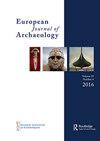从新石器时代的盛衰到铁器时代的高峰和衰落:从放射性碳年代推断的瑞典南部人口和定居动态
IF 1.4
2区 历史学
0 ARCHAEOLOGY
引用次数: 1
摘要
本文介绍了瑞典最南端考古遗址从公元前9000年至今的6637个放射性碳年代。基于校准的放射性碳年代的总概率分布(SPDs),作者考虑了定居点和人口的长期趋势。大多数日期来自斯堪尼亚西南部肥沃、人口稠密的平原,但沿海低地和森林高地也有代表性,可以讨论中部和周边地区之间的关系。作者区分了不同类型的考古背景和特征,以及不同类型的年代材料,以便更好地了解人口和定居点变化背后的过程。他们强调了SPD揭示的三个时期和现象:新石器时代(公元前4000-3700年)开始时人口急剧增加,随后急剧下降;从青铜时代早期到罗马铁器时代的稳定而持久的扩张(公元前1500年-公元200年);北欧晚期铁器时代(公元七世纪)的减少,特别是在最近被殖民的高地地区。提出的SPD为瑞典南部的考古学提供了一个新的框架,并为讨论定居和人口发展的长期趋势提供了经验基础。本文章由计算机程序翻译,如有差异,请以英文原文为准。
From Neolithic Boom-and-Bust to Iron Age Peak and Decline: Population and Settlement Dynamics in Southern Sweden Inferred from Summed Radiocarbon Dates
This article presents 6637 radiocarbon dates from archaeological sites in southernmost Sweden, from 9000 cal bc to the present. Based on summed probability distributions (SPDs) of the calibrated radiocarbon dates, the authors consider long-term trends in settlement and human population. Most dates are from the fertile and densely populated plains of south-western Scania, but coastal lowlands and forested uplands are also represented, allowing for a discussion of the relationship between central and peripheral areas. The authors distinguish between different types of archaeological contexts and features and between different types of dated material, so as to better understand the processes behind population and settlement change. They highlight three periods and phenomena revealed by the SPDs: a strong population increase at the onset of the Neolithic (4000–3700 cal bc), followed by a sharp decline; a steady and long-lasting expansion from the Early Bronze Age to the Roman Iron Age (1500 cal bc–cal ad 200); and a decrease in the Nordic Late Iron Age (seventh century ad), particularly in recently colonized upland areas. The SPDs presented provide a new framework for archaeology in southern Sweden and offer an empirical basis for discussion of long-term trends in settlement and population development.
求助全文
通过发布文献求助,成功后即可免费获取论文全文。
去求助
来源期刊

European Journal of Archaeology
ARCHAEOLOGY-
CiteScore
3.40
自引率
6.70%
发文量
58
期刊介绍:
The publication organ of the European Association of Archaeologists, the European Journal of Archaeology seeks to promote open debate amongst archaeologists committed to a new idea of Europe in which there is more communication across national frontiers and more interest in interpretation. The journal accepts not only new empirical data and new interpretations of the past but also encourages debate about the role archaeology plays in society, how it should be organized in a changing Europe, and the ethics of archaeological practice. All periods are covered; papers, review articles, interviews and short "debate" pieces are all sought. Whilst English is the primary language of publication in the EJA, papers submitted in French or German will be given equal consideration.
 求助内容:
求助内容: 应助结果提醒方式:
应助结果提醒方式:


